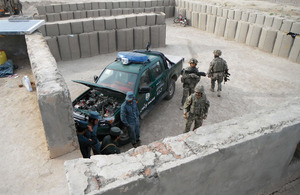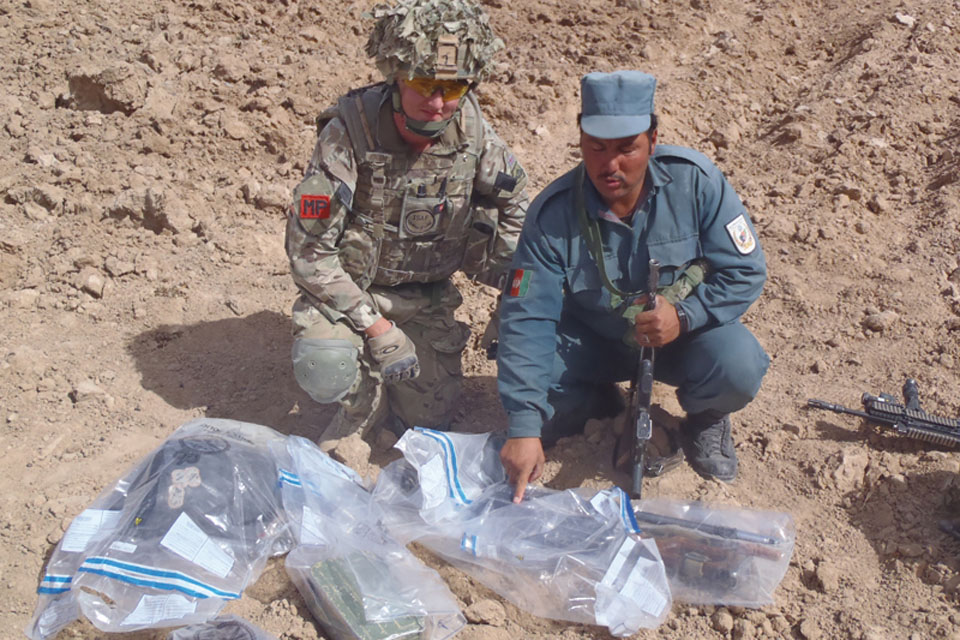How the Royal Military Police support operations
Half-soldier, half-police, wholly committed, Ian Carr writes from Camp Bastion about the work of the Royal Military Police.

Royal Military Police passing on incident investigation skills to the Afghan Uniform Police [Picture: Crown Copyright/MOD 2012]
For those of you whose view of the Royal Military Police (RMP) is still influenced by the BBC TV series ‘Red Cap’, there’s more to life in the RMP than that.
Speaking to Defence Focus over a tea (in a proper mug) outside the Theatre Provost Company HQ at Camp Bastion, Captain Dave Tracey, the RMP company ops officer, explained how they support the military in theatre:
We are about company strength and our operational area extends beyond Helmand province out to Kabul and Kandahar.
So they are busy bobbies.
Their main effort is spread across the Special Investigation Branch (SIB), where personnel are drawn from the RMP SIB and the RAF Police Close Support Element, and, working alongside the Welsh Guards, mentoring and advising as part of the Police Advisory Teams and the Police Mentoring and Advisory Group.

Training a member of the Afghan Uniform Police in how to gather and record evidence [Picture: Crown Copyright/MOD 2012]
They are the subject matter experts in all aspects of investigation, policing and detention. What they provide is a unique combination of front line soldiering and policing skills.
In Afghanistan the SIB element of the RMP’s work means not only investigating serious Service offences, just as they would anywhere else in the world of soldiering, but they are also brought in when someone is killed in action.
The death of every Service person killed on operations has to be thoroughly investigated in accordance with national police procedures. It is extremely difficult and sensitive work:
The SIB effectively acts as the coroner’s representative out here,” said Captain Tracey.
Thanks to their military training, the SIB can go where others can’t to gather evidence at the scene and establish the facts surrounding the death.
A member of the RMP, usually SIB, will also support the coronial process by accompanying the body from the hospital in Bastion to the coroner’s in the UK:
We have to ensure continuity of evidence,” said Captain Tracey.
All of this is designed to ensure that the next of kin, through the coronial process, have a full understanding of the circumstances in which their loved ones have died.
The RMP also work alongside troops right across the area of operations giving advice and guidance on policing matters. They make sure that what has been taught on the training ranges is applied on the ground:
That means things like making sure that detainees’ basic human rights are protected and that they are treated properly, as laid down in the Geneva Convention,” said Captain Tracey.
Another thing we involve ourselves in is forensic surety - that means working in conjunction with the WIS [weapons intelligence] guys and the counter-IED guys to ensure that anything lifted off the ground is properly exploited, either in terms of being used as evidence or in providing intelligence.
Some of this advice and guidance is about reminding soldiers to use proper policing skills and drills that they have been taught. For example, when dealing with evidence, not to handle it with bare hands and risk contaminating it or covering it with fingerprints.
If this makes the RMP sound like an aloof, brooding presence staring over the soldier’s shoulder, Captain Tracey will set you right:
Our guys are right there in the thick of it with the infantry. They patrol daily with the ground call signs [the soldiers] and are very much a part of the teams.
To build that working relationship the RMP embed with the troops as soon as they can, sometimes training with them for 12 months before they are deployed:
We can’t send people forward, especially if it’s a mentoring or advisory job, unless they are fit and confident,” said Captain Tracey. “We need people who are physically robust and who can conduct themselves as soldiers.
I’m not saying we are first through the door if we are clearing a compound, but we have to have those green skills and be tactically aware.
So, RMP personnel need to be soldiers first. But they also need to be mature enough to know what each situation demands, when they need to step in, when they need to focus on a policing role, and when to provide mentoring:
One of the things we do is, if the soldiers are going to recover evidence, first we make sure it’s worth recovering, and, if it is, that it is done properly.
For example, for a drugs find to count in an Afghan court, the cache must weigh at least five kilos. That may sound like a lot to us, but, although opium is illegal under Afghan laws, there are still situations where poppy is the only crop and the farmer may be growing small quantities under duress:
That said, finds of 65 to 70 kilos, and even ones of 300 kilos, are not unheard of,” said Captain Tracey. “It’s then that the RMP step forward and say ‘this is the five-kilo sample we are taking’, and the rest is destroyed in place.
We are warrant-holders, so we have that degree of autonomy within the battle group we are embedded with, even though we work closely with them.
Our chain of command is through our platoon commander straight through to the HQ.
That degree of independence and separation is important for what Captain Tracey describes as a tough part of the job, the provision of police support to the unit they are working with so that Service discipline and Service law are maintained:
It is a tough ask, because if you have been embedded with these guys, in some cases for over a year, if you see something inappropriate you have to instantly say ‘you’ve got to stop that and follow the rules before it becomes serious and I have to do something other than just tell you about it’,” said Captain Tracey.
That takes moral courage, especially if the RMP member is a brand new Lance Corporal having to tell a Lieutenant or a Captain that what he is doing is wrong:
The guys have really stepped up to the mark, and for the most part there hasn’t been anything that has developed into a real drama,” said Captain Tracey.
For the most part, the behaviour of soldiers that the RMP serve alongside has been exemplary. But it would be naive to think that in a pressurised environment like this soldiers won’t occasionally get themselves into bother.
So what sort of things do the RMP have to deal with?
Minor assaults, they may not be serious, but fighting is breaking the Service law, so we have to get to the bottom of who started it, and who did what to whom,” said Captain Tracey.
But one we do see, especially when guys are at the beginning of the tour, is people leaving their weapons behind, for instance in the dining facilities.
The RMP investigate and report the incident to the chain of command, and it is then their responsibility to take the appropriate action:
They decide if it’s enough just to call the person an idiot,” said Captain Tracey. “Sometimes we have soldiers turning up looking sheepish; one arrived just seconds after we received the weapon because he had been chasing the person who handed it in down the road.
Sometimes the RMP have to investigate more serious incidents, including allegations made by local nationals against Service personnel. All such allegations have to be investigated thoroughly and with an open mind.
Occasionally, this will result in Service personnel being referred to the independent Service Prosecuting Authority so that they can decide whether to bring charges. Thankfully, however, such cases are few and far between.
As the Afghan forces increasingly take the lead in Helmand province, so the RMP’s role mentoring the instructors is developing:
We coach them in witness-handling and taking statements, just making sure that they are delivering what they need to,” said Captain Tracey.
On top of this there is a small RMP section providing support to the Afghan Prosecution Support Section, ensuring that professional standards are maintained in the UK holding facility at Bastion, and that evidence-based case files are compiled to support the transfer of detainees to the Afghan authorities.
And, at the end of a tour, the RMP are on hand to wave the troops goodbye - and make sure that their Bergens don’t contain any illicit war mementos. But Captain Tracey is keen to throw off the mantle of being the anti-fun police:
In fact there are things that are allowed to be taken back, you just need to be sensible and go through the right process, and we can help and direct people so they get it right,” he said.
And with the help and guidance of the Provost, can there ever be any excuse for not getting it right?
This article is taken from the October 2012 issue of Defence Focus - the magazine for everyone in Defence.